Learning and knowledge sharing are fundamental to the LHSS Project. We invite you to search LHSS knowledge products and resources for the latest approaches, insights, and learning in the field of integrated health systems strengthening.
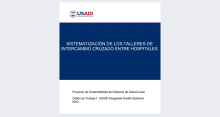
The report highlights the key aspects and lessons learned in managing severe COVID-19 cases through a series of exchange workshops. These workshops, coordinated by the Deputy Management of Hospitals of the National Health Service and the Regional Health Directorates, aimed to facilitate cross-learning among hospitals that participated in the first two phases of training. The focus was on gathering evidence about the training process, assessing the applicability of various concepts and techniques, and providing recommendations for managing severe COVID-19 cases in intensive care units.
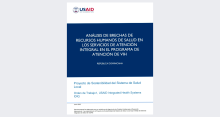
In view of the incorporation and standardization of community services at the level of the Comprehensive Care Services (SAI), LHSS in coordination with the National Health Service (SNS) worked to advise and evaluate the needs of human resources in health for the provision of quality services and coverage of the needs of patients both at the site level and at the community level for the implementation of a human resources plan. To this end, the first step was to analyze the gap in quantitative and capacity terms to support at the central level with the development of provincial human resources plans to close gaps and deliver the portfolio of necessary services.
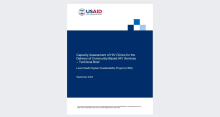
The provision of HIV care services in the Dominican Republic largely consists of service provision at clinical sites. Although some of these sites have incorporated community-based patient follow-up into their HIV service portfolio, the Government of the Dominican Republic (GoDR) has only recently incorporated community-based HIV services into the regulatory framework of the national HIV care program. In doing this, the GoDR aims to expand the delivery of community-based HIV services in a sustained and phased manner. Thus far, the new strategy has been implemented primarily in clinical sites supported by the U.S. President’s Emergency Plan for AIDS Relief (PEPFAR), with the financial support of PEPFAR-funded care and treatment projects.
During its first and second year of implementation, the LHSS has supported GoDR to expand its plan for community-based HIV services nationwide. To that end, LHSS has worked with GoDR counterparts to review, develop, update, and implement a comprehensive policy framework— including national guidelines and standard operating procedures (SOPs)—that supports the provision of HIV care at both clinical sites and the community level.

The current Health System in the Dominican Republic is the result of significant reforms over the past two decades, guided by the Ten-Year Health Plan (2006-2015) and the National Development Strategy 2030. It integrates services from the Ministry of Public Health and the Dominican Social Security Institute into a unified network to ensure health and social security for all citizens, led by the Ministry of Health. This feasibility assessment focusses on the Family-Based HIV Service Model in the Dominican Republic. The model addresses the needs of families with HIV-positive members by integrating clinical care with economic, social, and legislative support. It emphasizes accessibility, reducing stigma, and considering the emotional and mental health impacts.
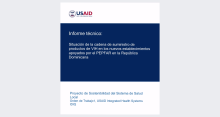
In 2010, through Ministerial Agreement 000019-2010, the MSP of the Dominican Republic, with technical and financial assistance from USAID, began the organization of the Single System for the Management of Medicines in Supplies (SUGEMI), with the aim of contributing to improving people's access to these products. SUGEMI began its activities in 2012 with the integration of the management of the supply of medicines and supplies used in the tuberculosis and HIV programs.
This report highlights the health network model established in the Dominican Republic for HIV prevention, diagnosis and health care services provided at the first level of care through specialized units called Comprehensive Care Services (SAI).
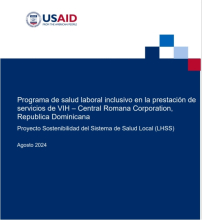
This report provides insight in the inclusive of the provision of HIV services, is to address the existing gap in the supply of health services related to HIV and other sexually transmitted infections (STIs) within the private workplace and in key populations. The target population of Central Roromana's HIV-inclusive workplace health program is mainly focused on their rural employment, specifically those employed in the field and agriculture. This demographic represents a high percentage of Haitian migrant employees and/or those of African descent. However, the coverage and provision of services outside the structure of the company's health program may be limited due to the vulnerabilities and limitations inherent to an irregular immigration status. To address this situation, the company has taken the initiative to hire a private insurance service for the enrollment of employees with irregular immigration status. This allows them to have health service coverage at other clinical sites in the province, thus ensuring that all employees have access to necessary medical care, regardless of their immigration status.
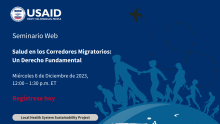
Join LHSS, Doctors without Borders, and the United Nations High Commissioner for Refugees in Honduras as we discuss the relationship between social protection in health and migration corridors in Latin America.
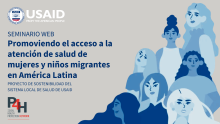
Join LHSS and the P4H Network on June 14 as we hear from local, national, and regional institutions working to advance social health protection for women and children in high migration contexts.
The purpose of the assessment, conducted in 2021 by Two Oceans in Health for the LHSS Latin America and Caribbean Activity, was to understand the Dominican Republic context for expanding social health protection to migrant women.
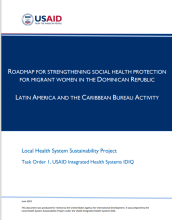
LHSS provides technical assistance to the Dominican Republic, and this five-year roadmap outlines a strategic vision, objectives, and initiatives for reaching the final milestone of expanded insurance and standardized health service packages for migrant women residing in or transiting through the Dominican Republic.
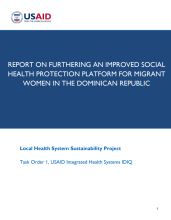
LHSS activity in the Dominican Republic during its first year of implementation and detailed steps to pilot initiatives that aim to improve SHP for migrants (including women) in the Dominican Republic
This video highlights the first training session for the standardization of HIV community services held in Santo Domingo, September 2021 by LHSS in partnership with the National Health Service.
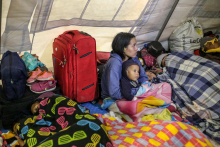
For countries facing a large influx of migrants, the best way to ensure that these new members of society have sustained access to essential health services is to have a long-term strategy – one that builds on existing health platforms.
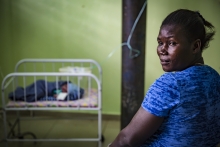
In the Dominican Republic, the dual impact of large numbers of migrants and a health system overwhelmed by COVID-19 has meant that fewer health services are available for migrant women. LHSS is working to improve health protection for the country’s migrant women, most of whom come from Haiti.
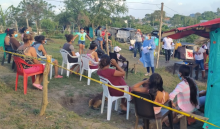
Population movement of this magnitude places huge stress on health systems in receptor countries. How can health care for migrants be financed? How can health system capacity be expanded? And how can health sector policies and national migration policies be harmonized?
